CT Urogram or computerised tomography urogram is an imaging test recommended to assess the urinary tract condition. The urinary tract structure involves the bladder, kidneys, ureters, which are the tubes that transport urine from the kidneys to the bladder. Through the CT urogram in New Jersey, the physician injects contrast material into the patient’s vein, which streams to outline the bladder, kidney, and ureters. The dye aims at increasing the visibility of the organs so they can be perused for accurate diagnosis.
When is CT Urogram recommended?
The medial test is suggested to detect conditions associated with the urinary tract. If the patient complains of back or side pain or bloody urine, the doctor may recommend a CT urogram to discover the symptoms and glitches in the structures. Typically, the imaging test is advised to diagnose the following ailments:
- Bladder stones
- Tumour or cysts
- Kidney stones
- Cancer
- Structural glitches
- Serious urinary tract infections
Are there any side effects associated with CT urogram?
The medic infuses X-ray dye during the imaging process, also called contrast material. This can trigger allergic symptoms in the patients such as:
- Warm or flushing sensation
- Itching
- Hives
- Pain at the site of infusion
- Feeling nausea
These reactive signs are usually minor. A doctor would provide you with the medication to manage them effectively. There is a notion that CT urogram may augment the risks of evolving cancer. However, this is not so in a single instance. Though, the risks do pose in the case of patients who have undergone CT urogram in New Jersey multiple times. Appraise your doctor if you are pregnant beforehand.
What do healthcare providers expect before CT urogram?
Before having a CT urogram, the member of medical staff may ask you the following:
- Medical past and present
- Assess the blood pressure, body temperature, and pulse rate.
- Don hospital gown, remove glasses, jewellery, or other stuff made of metal.
- Inform if you sustain any allergies especially, Iodine.
- If you administer medications like NSAIDs, metformin, or antibiotics.
Now you have the needed information about CT urogram and what does it entail in detail.
